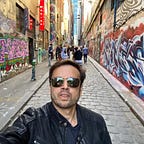True Freedom
On Software And Society
People said I should accept the world. Bulls**t!! I don’t accept the world — Richard Stallman, Founder of The Free Software Movement
On the tenth anniversary of the iPhone and the launch of iPhone X today, Apple’s market capitalization briefly surpassed $900 Billion. Approaching $1 trillion, Apple is on the verge of becoming five times larger than the GDP of Greece. It’s stock ended the day at $172.5 with another record breaking quarter. By any standards, Apple is the ultimate icon of the closed system movement which is despised by the free software or open source software movement founded by Richard Stallman. In countless households today, the debate between Apple and Android rages on. The closest parallel is the comparison of Bitcoin (open source and decentralized) vs Fiat currency (closed and centrally controlled). If art imitates life, software mirrors our society. While some countries such may be considered relatively closed, others such as the US and India are more open. This article explores the concept of liberty, equality and fraternity through their manifestations in the software and crypto currency world to answer an age old question : what does freedom truly mean?
